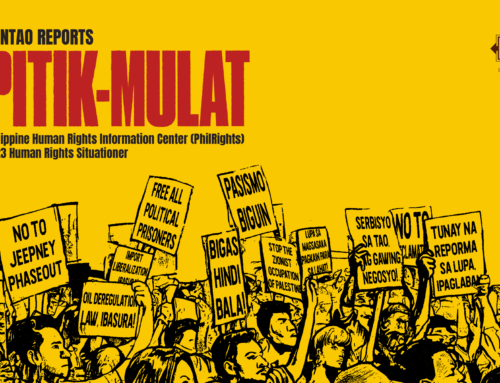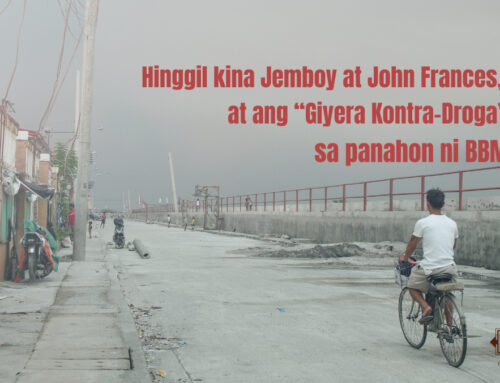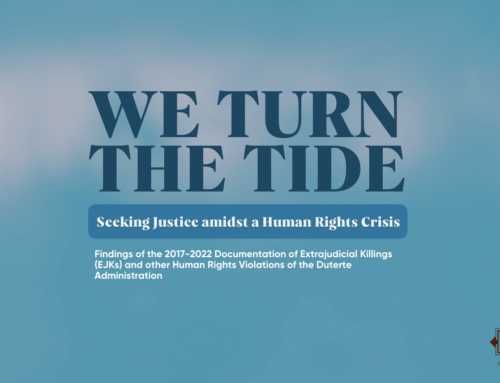by the Philippine Human Rights Information Center
A few days before her son was killed, a friend had told Liza: “You should tell him to leave. There are men looking for him.” It had just been a few weeks since Duterte took power and his anti-illegal drugs campaign was in full swing in 2016. It was widely known in their community that Liza’s son had become a target.
So that morning Liza told her son: “Go stay at your aunt’s place for now.”
But he didn’t want to go. “I won’t leave. Don’t worry about it, Ma. I don’t have any drugs. My conscience is clear. Besides, I have someone on my side, Ma. May kakampi ako.”
It was a puzzling answer which prompted Liza to ask: “What do you mean? Who’s on your side? Sino ang kakampi mo?” And her son pointed to the sky. “There. He’s up there. May kakampi ako.”
“I believed him, I trusted him. So, I didn’t insist that he leave.”
But that was the last time they talked. He was dead by the time Liza returned home that afternoon, treated by men with guns “like a piece of a chicken that they had fun with. Parang manok na pinaglaruan.”
***
“I will admit that my son lost his way, that he used illegal drugs,” Liza says.
He didn’t finish high school, and was working as a tricycle driver, when his friends introduced him to shabu. “In the beginning, he would just try it out. Patikim tikim lang. He worked at night and it helped keep him awake,” Liza says.
But he started going deeper into drugs, and his friends were responsible in many ways, Liza said. Her son’s room, their home, became the place where they did drugs. It took some time for Liza to realize this was happening. Her son lost his job as a tricycle driver. She began to notice his friends coming to their home more frequently to hang out in his room. She eventually found out that that was how he was earning money. His friends would pay him Php 20 each to use his room for drugs. “Twenty pesos each. Bente bente. That’s what he used to buy rice for his family. Pinambibili ng bigas para sa pamilya niya.”
“That was his mistake. Iyon po ang pagkakamali niya.”
***
They had a hard life. Liza and her husband had grown up in the same poor neighborhood in Manila. They were forced to move to another place during an urban poor relocation. Liza worked as a domestic helper in the Middle East for a couple of years. But she had to return home when their eldest child, who was then a teenager, died unexpectedly.
Her husband worked as a shoemaker, but suffered a stroke and eventually could no longer work. Liza supported the family by selling herbal products door to door.
They were a big family living in a house. Her son lived in a separate section of their home with his family.
In the 2016 elections, her husband supported Grace Poe. Liza voted for Mar Roxas. They didn’t want Rodrigo Duterte after hearing scary stories about the way he used to run Davao City. Shortly before Duterte won, there was already talk about a coming war against drug dealers and drug addicts.
Even her son and his friends began talking about it, joking about it. “”Naku, ‘wag na tayong gumamit. Uupo na si Duterte, ipapapatay tayo. We should stop. Duterte is about to come to power. And he will have all of us killed.”
His friends didn’t take the threat seriously, and Liza told them: “You always come here. My son will be killed because of you. This is his house where you are using drugs. Mapapatay anak ko, pero kayo hindi kayo mapapatay.”
Her son understood her concerns, she said. “It’s okay, Ma,” he said. “I also don’t want to use drugs anymore.” The problem was with his friends, she said. “They kept coming to our house. They would go straight to his room.
“Mapapatay ang anak ko. My son will be killed,” she kept telling them. “You will live. Kayo, mga buhay kayo. You are safe. But my son’s name is out there.”
***
Liza recreated what happened that day from what some of her neighbors told her.
About 20 policemen were positioned on their street the day of the raid. Three of them came to Liza’s son’s room where they found three of his friends sleeping.
The armed men let the three go. But they told Liza’s son to stay.
“You’re going to die. Mamamatay ka,” one of the men said.
Liza imagined him cowering in the corner of the room when they opened fire. “I can see him sitting in the corner and trying to cover his head with a pillow. And then he fell.” There was blood all over the room. Someone told her that they heard one of the men say, “Oh, you’re still alive! Ah, buhay ka pa ha!” And they shot him again.
Liza choked back tears as she said, “They treated him like a piece of chicken that they toyed with. Parang manok na pinaglaruan ang anak ko.“
Her paralyzed husband was home when all this happened. The police made him leave their home. “He heard the shots. That made him even weaker.” He was never the same after that. “He stopped speaking. He just cried all the time. Iyak na lang nang iyak.” He died two years later.
Her neighbors told her that the armed men took out a body bag which they zipped open to show “Here’s the addict.” There was a gun, cash and shabu on the side. “They said they killed him because he fought back. Nanlaban daw. But my son didn’t have a gun.”
****
The police took her son’s body to a funeral parlor. “They wanted Php 35,000 for an autopsy. I asked, ‘Why do you need an autopsy, you already know how he was killed?’ But they said, ‘We really need an autopsy.’”
“I don’t have that kind of money. You already killed my son and now you’re looking to make money from what happened to us. Peperahan ninyo pa kami.”
The funeral parlor representative said, “Okay, ‘Nay. We will bring it down to Php 24,000.” But there was a catch, she was told. She has to sign a death certificate that says her son died from sepsis, not gunshots. Liza protested. “Well, you don’t have money for the autopsy.”
“I could no longer think clearly and I just let them do that. So, my son’s death certificate says he died from sepsis, not from gunshots.”
*****
“I cry whenever I remember him. Especially when I’m alone. I remember my children and tell myself, “It was better when they were little. We were together.” But they grow up and lead their own lives. Kanya kanya na. Di ko na hawak ang isip nila. I no longer control how they think.”
Liza stopped working except for occasionally selling food from their home. Her other children and grandchildren help her out “Nawalan ako ng gana. I just didn’t have the energy to work.”
In 2019, a friend told her about PhilRights’ work in their community. She met Gloria who told her, “This is a good group. Kung anong nararamdaman mo, maiibsan ang kalungkutan mo. Whatever you’re feeling, this will help you overcome the sadness. Iyong nasa loob namin, nailalabas namin. We’re able to express what we feel inside.”
She has been active in the group since then. She has helped look for other victims of the drug war violence. She has talked to some of them—including a woman security guard whose husband who was ill was gunned down for no reason at all during an operation.
“Tulong tulong po kami. We help each other out. We would visit a victim together. Sama-sama po kami.”
What they are doing can be dangerous, she said. “Noong una po, may takot po ako. In the beginning, I was afraid.”
But she was with other women who were not afraid. “Lumalaban. They are fighting back. Habang tumatagal, sabi ko, ‘Kung kaya nila, bakit hindi rin kaya? If they can do it, why can’t I do it too?’ That’s how I began to think about it. ‘Kung kaya nila, kaya ko rin. If they can do it, I can do it too.’”








